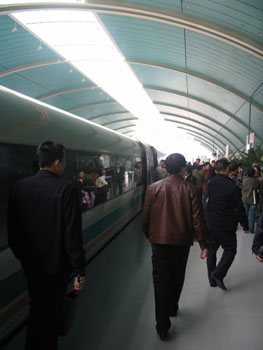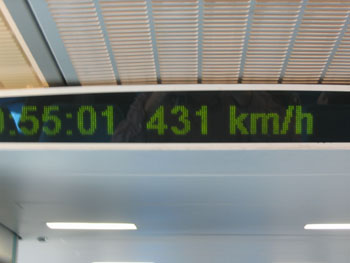I have always found Scotland fascinating. They take barley and water and create something more expensive than petrol
– Kwame Owino
|
|||||
|
The House of Lords, Britain’s upper chamber in Parliament, has thrown out government proposals on identity cards in the UK. If anyone needed any doubt on the likely disaster that ID cards would prove to be, read this by Henry Porter. Even those inclined to roll their eyes at our libertarian worries might get the jitters about the details of Porter’s article, even if only a part of what he says is true. The fight is not over yet. Here is a teaser from the first chapter of Good & Plenty, Tyler Cowen’s new book about public art and the liberal tradition, out next week:
Q: What does the inside of Tyler Cowen’s head look like? A: A sack o’ cats heading for the river, i.e., all fur, teeth and claws, yet somehow… endearingly cute. At any rate, the internal wrestling match should make for a most excellent read.
I think that the economics profession is showing a bit more interest in entrepreneurship, at least since the 1980s. The “Austrian” school that gave us the likes of von Mises, Ludwig Lachmann and Israel Kirzner, for instance, puts the entrepreneur pretty much front and centre of the economic picture. For sheer gusto in defending the entrepreneur, there is still to this day no better advocate in my view than George Gilder. Welcome news from the Telegraph yesterday, as a new clinic opening in Nottingham will provide test for genetic disorders in embryos. This ensures that the parents have the choice of selecting a healthy embryo and can bring the child to term. The price of the test is six thousand pounds. This will also allow parents to conceive “saviour siblings” who hold the potential for curing their sick brothers and sisters through transplants. It is overdue for such facilities to be established in Britain. The opposition was opposed to family values. They accused any parents exercising this choice of eugenics.
The Human Fertilisation and Embryology Authority continues to exercise unnecessary regulation on parental choice. They should have no say over this matter.
The UK’s Channel 4 news channel tends, in my experience, to cover the news with a fairly obvious leftist slant, so it was quite a surprise this evening to watch the programme’s longish report about what is going on in Venezuela, focussing on the activities of President Chavez and his increasingly dictatorial leanings. I have a very rough-and-ready theory, which holds that countries blessed with vast natural resources are, in some senses, cursed. Venezuela is one of the world’s top oil producers and at a time when crude is trading at the present high levels, it means that a demagogue like Chavez can buy favours with selected groups for quite a while. A country not so blessed — such as Hong Kong say — has to live on its free market wits. In some cases an oil-rich place — such as Dubai, which I mentioned a while ago — is led by folk with the wit to develop its economy with a mind on what will happen when the black gold runs out. This blog does not seem to like Chavez very much. As and when his government falls, it will not be a pleasant process. While walking throught the old (Chinese) section of Shanghai today, I walked pass a shop offering to print T-shirts to whatever design I liked. This was the lineup of sample shirts out the front. I don’t know about you, but if I was the man on the left I might be slightly miffed about being put in such company.  On the other hand, since this is officially still a communist country, perhaps this is meant as the highest possible compliment to Mr Beckham. Communists for free expression are like vegetarians for veal. – Perry de Havilland, at Saturday’s march for free expression in London The New Individualist magazine has put one of the Jyllands-Posten ‘Mohammed Cartoons’ on its cover. If any other US publication has published them at all, I am not aware of that (hopefully the commentariat will let me know if I have missed one). In the UK, as far as I know only The Blanket have done the same. As a commenter has pointed out, anyone with an internet connection can see them on a thousand sites, so the point of publishing now in hard copy is to make a statement rather than facilitate people seeing the cartoons themselves. The media in Britain and America have hardly covered themselves in glory on this issue, leaving European editors to make most of the running in standing up to those who howl for legislated intolerance (and I am not just talking about Islamo-fascists), so credit to Robert Bidinotto for sticking his head over the parapet and pouring some hot oil on the barbarians below. I must concede that I was pessimistic regarding the outcome of the Abdul Rahman apostasy case. The row over the Muslim-turned-Christian saw international pressure brought down upon the head of Hamid Karzai, the President of Afghanistan. A difficult job; he is wedged between the expectations of Afghanistan’s overseas backers and the desires of a relatively conservative Muslim society – the same fractured society who the oft-described “mayor of Kabul” needs to establish authority over if the Afghani nation-building project is to be successful. I rather suspected that the latter imperative would win out and Abdul Rahman would face a barbaric and outrageous death at the hands of Islamic zealots. This fate may well befall him if he is allowed to leave the relative security of a solitary confinement cell. However, for the time being it now appears likely that he will be freed. If this is the case, it is indeed wonderful news. It means that someone, somewhere has almost certainly had their arm twisted, and the most likely culprit hails from the executive office of Afghanistan. This could represent a weakening of Sharia’s weighty influence on the legal system in Afghanistan. Government meddling in the courts is rightfully deplored by friends of inalienable human rights, rule of law, due process and the separation of powers. It is a reflection of just how bad things are in Afghanistan when covert government intervention in the legal system represents a step forward. Regardless, this is an event to inspire a glimmer of optimism. “You will take possession by military force, of the printing establishments of the New York World and Journal of Commerce… and prohibit any further publication thereof… you are therefore commanded forthwith to arrest and imprison… the editors, proprietors and publishers of the aforesaid newspapers” Order from Abraham Lincoln to General John Dix, May 18, 1864.  On the British Airways flight from London to Shanghai yesterday morning, there were the usual announcements about recommended rental car partners and hotels and the like. With respect to getting into the city of Shanghai, they simply announced that “We recommend that you take a taxi”, as these are apparently cheap and relatively quick. I have a certain aversion to taking taxis in unfamiliar cities, as unscrupulous taxi drivers exploit tourists in many cities of the world, and I can never really tell what will happen if I get in one. (On the other hand, the recommendation from the airline probably suggests that a taxi caught from a rank at the airport in Shanghai would have been fine).  However, there was no chance I would take the advice. Because let’s face it, there are some things that I am not capable of resisting. A sign saying “Magnetic levitation train” is definitely one of them. As a practical thing to build, the maglev to Shanghai airport qualifies as almost entirely useless. It cost some ridiculous sum of money, the railway station is a little too far from the airport terminal (and is badly signposted), the city destination is an obscure part of Pudong from where one has to get the subway or taxi to anywhere one might actually want to go to, and there is only one train every half hour on the maglev. If one has to wait for 25 minutes, then this rather negates the fact that the 30km journey into Shanghai only takes seven and a half minutes. It would have made far more sense to simply extend the subway line that goes to the city maglev terminal all the way to the airport. A train journey from the airport would have then taken perhaps an hour, but it would have been a sensible way to get to and from the airport. The maglev was built so that they could build a maglev. That was all it was. However, this is just about the only transport journey I have made in my life that passengers have got excited about just because it was. Riding a Boeing 707 in 1958 was perhaps like this. There was an LED readout on the train giving the speed, and as the train really got going passengers got up and took photographs of the indicator. I was one of them.  Normally, I am nearly as bad as Brian Micklethwait. I take seeing people take photos of something as an invitation to take photos of them. However, in this case I did not do so. It was just the indicator itself I was interested in. For Christ almighty that was fast. |
|||||

All content on this website (including text, photographs, audio files, and any other original works), unless otherwise noted, is licensed under a Creative Commons License. |
|||||


